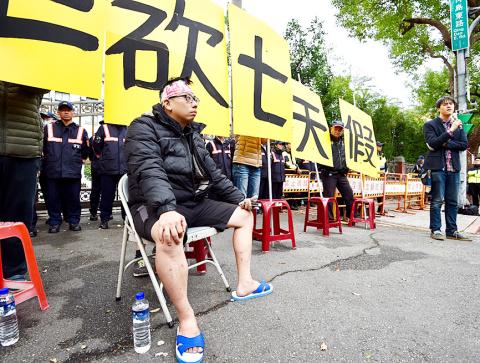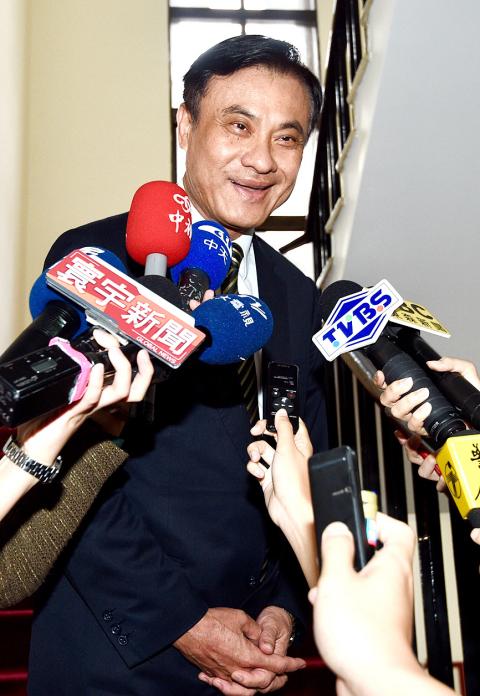Legislative caucuses yesterday reached an agreement on reviewing a proposed amendment to the Labor Standards Act (勞動基準法) that seeks to cut seven national holidays.
After weeks of controversy and rounds of cross-caucus negotiations, the legislature yesterday reached a consensus on the handling of the disputed amendment involving the proposal for workers to have “one flexible rest day and one fixed day off,” and a reduction of national holidays from 19 to 12 to accommodate a 40-hour workweek that cleared the legislature in May last year.
The resolution stated that the Social Welfare and Environmental Hygiene Committee amendment review on Oct. 5 would be retracted, a report by relevant agencies would be prepared and a question-and-answer session would be held on Monday next week, a public hearing on Wednesday next week and an article-by-article review of the amendment on Thursday next week.

Photo: Peter Lo
The meetings can be extended to midnight if needed, it said.
The resolution also prohibits any podium occupation attempts during the meetings and exempts the review conclusion, if sent to a cross-caucus negotiation, from the one-month negotiation period so that it can be dealt with at a floor meeting as soon as possible.
The legislative regulations stipulate that a bill be sent to the general assembly after a one-month negotiation period if the caucuses fail to reach a consensus during that time.

Photo: Peter Lo
The Oct. 5 review conclusion was made amid a chaotic scuffle among lawmakers in the committee, and opposition lawmakers said that the conclusion was made in violation of due procedure.
The caucuses agreed to reexamine recordings made on the day.
On Wednesday last week, four separate recordings of the meeting by the Legislative Yuan, the New Power Party, the Chinese Nationalist Party (KMT) and Eastern Broadcasting Co (EBC, 東森電視) were brought to the committee.
Only the EBC’s recording picked up a KMT lawmaker voicing dissent during the meeting.
Democratic Progressive Party (DPP) caucus whip Ker Chien-ming (柯建銘) said that the examinations should be based solely on recordings by the Legislative Yuan.
Although the recording did not show any wrongdoing on the part of the committee chairperson, “the DPP agreed to make concessions [to review the bill] for the sake of conciliation and harmony between the ruling and opposition parties,” Ker said.
Separately yesterday, labor protesters signaled a possible compromise over the amendments, saying they would consider proposing an alternative set of “complementary measures” to proposed cuts in national holidays.
Workers’ Struggle Alliance member Kuo Kuan-chun (郭冠均) said civic groups would hold discussions on proposing their own set of amendments at an alternative hearing on the reforms to be hosted by the alliance on Tuesday next week.
“If the consensus is that the national holidays do not necessarily have to be preserved, we hope to come up with a set of complementary measures which fully protect labor rights, unlike the fake measures, proposed by the DPP,” he said.
Meanwhile, the protesters released Hsinchu Confederation of Trade Unions secretary-general Fan Yu-mei (范玉梅) from her promise to continue a hunger strike until she was hospitalized.
Her departure leaves Taiwan International Workers’ Association member Hsu Wei-tung (許惟棟) the sole remaining protestor of seven who began a hunger strike on Friday last week.
“Everyone wants to hold out, but they all face different circumstances,” said Kuo, citing family pressure, health concerns and an inability to take further days off from work.
Additional Reporting by CNA

A Ministry of Foreign Affairs official yesterday said that a delegation that visited China for an APEC meeting did not receive any kind of treatment that downgraded Taiwan’s sovereignty. Department of International Organizations Director-General Jonathan Sun (孫儉元) said that he and a group of ministry officials visited Shenzhen, China, to attend the APEC Informal Senior Officials’ Meeting last month. The trip went “smoothly and safely” for all Taiwanese delegates, as the Chinese side arranged the trip in accordance with long-standing practices, Sun said at the ministry’s weekly briefing. The Taiwanese group did not encounter any political suppression, he said. Sun made the remarks when

The Taiwanese passport ranked 33rd in a global listing of passports by convenience this month, rising three places from last month’s ranking, but matching its position in January last year. The Henley Passport Index, an international ranking of passports by the number of designations its holder can travel to without a visa, showed that the Taiwan passport enables holders to travel to 139 countries and territories without a visa. Singapore’s passport was ranked the most powerful with visa-free access to 192 destinations out of 227, according to the index published on Tuesday by UK-based migration investment consultancy firm Henley and Partners. Japan’s and

BROAD AGREEMENT: The two are nearing a trade deal to reduce Taiwan’s tariff to 15% and a commitment for TSMC to build five more fabs, a ‘New York Times’ report said Taiwan and the US have reached a broad consensus on a trade deal, the Executive Yuan’s Office of Trade Negotiations said yesterday, after a report said that Washington is set to reduce Taiwan’s tariff rate to 15 percent. The New York Times on Monday reported that the two nations are nearing a trade deal to reduce Taiwan’s tariff rate to 15 percent and commit Taiwan Semiconductor Manufacturing Co (TSMC, 台積電) to building at least five more facilities in the US. “The agreement, which has been under negotiation for months, is being legally scrubbed and could be announced this month,” the paper said,

Japan and the Philippines yesterday signed a defense pact that would allow the tax-free provision of ammunition, fuel, food and other necessities when their forces stage joint training to boost deterrence against China’s growing aggression in the region and to bolster their preparation for natural disasters. Japan has faced increasing political, trade and security tensions with China, which was angered by Japanese Prime Minister Sanae Takaichi’s remark that a Chinese attack on Taiwan would be a survival-threatening situation for Japan, triggering a military response. Japan and the Philippines have also had separate territorial conflicts with Beijing in the East and South China